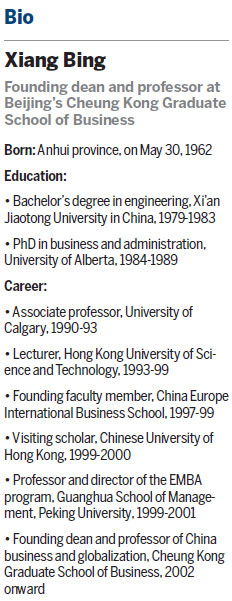Social responsibility leads to respect
Updated: 2016-07-15 08:09
By Cecily Liu(China Daily Europe)
|
|||||||||
Chinese companies must boost their efforts in order to take their place in the international community, leading professor says
Chinese companies need to champion social responsibility in their global expansion process to gain respect from the international community, says Xiang Bing, founding dean and professor of China business and globalization at Beijing's Cheung Kong Graduate School of Business.
By gaining respect from the global community, China and Chinese firms can take a lead role in the rapidly changing global business landscape as it undergoes a process of reconfiguration, and play a significant role in accelerating the creation of a good global governance system, says Xiang.
|
Xiang Bing says the values that China can bring to global development are not military or economic power, but leadership in business ethics. Cecily Liu / China Daily |
"In the past, global governance was created by US dominance, but now the Chinese government needs to contribute because as China increasingly globalizes, Chinese companies, people and interests are increasingly intertwined with the global environment," says Xiang, speaking during a recent visit to London.
"And if China can make the most of current opportunities to solve global problems, it will truly become a respected leader in the global community. It can lead the creation of a new business civilization that no longer just prioritizes profits.
"The values that China can bring to global development is not military power or economic power, but leadership in business ethics. China has the ability to contribute to the creation of global governance, which will bring rules and certainty to the global business environment."
He has been a keen advocate for the concept of a new business civilization over the years, and communicated this idea to many Chinese businesses executives who are alumni of the Cheung Kong Graduate School of Business, China's first privately funded and faculty-governed business school, founded with the support of the Li Ka Shing Foundation.

Founded in 2002, the school has globalized extensively in recent years through collaborating with Western academic institutions, including Judge Business School at the University of Cambridge and the Swiss business school IMD. Notable alumni from the Beijing school include Alibaba's founder Jack Ma and former Sinopec chairman Fu Chengyu.
Xiang, who received his bachelor's degree in engineering from Xi'an Jiaotong University in China and doctorate in business administration from the University of Alberta in Canada, was one of the seven founding faculty members of China Europe International Business School in Shanghai. He was also a professor of accounting at Peking University's Guanghua School of Management, prior to joining Cheung Kong Graduate School of Business.
He says one big problem lies within the China-US relationship, as both are major economies but have not reached consensus to work together on many issues, such as the creation of a coherent global trading environment.
For example, in the area of trade, various US-led and China-led packages exist in the world, which paints a system less efficient than if the two countries worked hand in hand to create a coherent global trade environment, Xiang says.
The US led the creation of the Trans-Pacific Partnership, a free trade agreement signed by 12 countries accounting for 40 percent of the global GDP. Launched this year, the TPP does not include China.
The other US-led key free trade agreement is the Transatlantic Trade and Investment Partnership, which is a proposed trade agreement between the European Union and the United States, and is seen by the US to be a companion agreement to the TPP. This also excludes China.
Meanwhile, China led the creation of the Asian Infrastructure Investment Bank to fund the building of infrastructure in the Asia-Pacific region, with the aim that connectivity will boost regional trade and investment ties. The bank has 37 founding member states, but did not attract support from the US.
Xiang says such division of trade into camps is a hindrance for global trade, and results from different thinking and expectations between the US and China behind existing trade organizations like the World Trade Organization.
He says one root cause of the trade divisions is the different understanding the two countries have over the implications of China joining the World Trade Organization in 2001.
Back then, the US wanted to gain certain benefits by supporting China's joining the WTO, such as gaining more access to China's market, encouraging China to take on more global responsibility and encouraging China to support the US on important global issues, Xiang says.
A decade later, when the US assessed that many of these expectations had not been achieved, the US started to lead discussions on trade agreements that do not include China, like the TPP and TTIP, Xiang says.
He adds that another trigger point for the US to embrace China in the global trade system is the threat that China brings to its global prominence. For example, three years ago during the free trade agreement discussions between China, Japan and South Korea, Japan proposed the idea of settling China-Japan trade in renminbi.
"This is a trigger point for the US becoming alert, because the US would think that there are lots of other Asian countries who would be very keen to settle their trade with China in renminbi directly, which means less use for the US dollar."
Xiang says these tensions all result from a "reconfiguration of the global trading system", which is an extension of the fractures from the China-US relationship. "In the past, when the US said yes, no one could say no, which formed the basis of a global governance system, but this is no longer the case."
Hence within the new global environment, there is a lack of overall governance. "There is no such thing as a global central bank, global securities regulatory commission, or global ministry of finance. Organizations like the G8 and G20 are ineffective in enforcing binding rules and creating a global governance system."
If solving the US-China issue is the key to creating the foundations of a new global governance system, then Xiang's suggestion is for the Chinese government to encourage key US multinational firms to be the lobbying forces for better US-China relations.
"China needs to understand that those with the greatest ability to help China are not US diplomats that go to China a lot, but are rather US multinationals that are keen to access the Chinese market. If the Chinese government further opens market access to them, allows them to pocket larger commercial profit, then they will lobby the US government for better relationships with China."
He says cooperation with US firms is the most effective channel of building good bilateral relationships, which is currently not being effectively used.
Meanwhile, Xiang points out one key factor Chinese firms need to consider in their globalization strategy is to do business in a sustainable and responsible way. Gaining such ethical acceptance from the global community is key, particularly as China is a newcomer to the global business scene and its emergence comes at a time of great global sustainability issues.
"To act like a responsible business is not at all about having high-technology, it is more a mindset issue. For example, a lot of Japanese food companies champion sustainability by only having one lunchbox to pack different food, but often in China it is very often to pack one lunch with five to six different boxes," says Xiang.
"To champion responsible practice is not for outward show, and it is not reflected through simple accounting and finances. Rather it is a new identity for Chinese businesses on the global stage."
cecily.liu@mail.chinadailyuk.com
(China Daily European Weekly 07/15/2016 page32)
Today's Top News
Live: Truck attack kills over 80 in Nice
Chinese FM extends condolences to attack victims
Li slams attack in France, expresses condolence
May stuns political world by appointing Boris Johnson
Li calls Sino-Mongolia ties 'best ever'
Russian, Chinese officials discuss space cooperation
25 killed, 50 injured as trains collide in Italy
EU called on to fulfill WTO promises
Hot Topics
Lunar probe , China growth forecasts, Emission rules get tougher, China seen through 'colored lens', International board,
Editor's Picks

|

|

|

|

|

|








